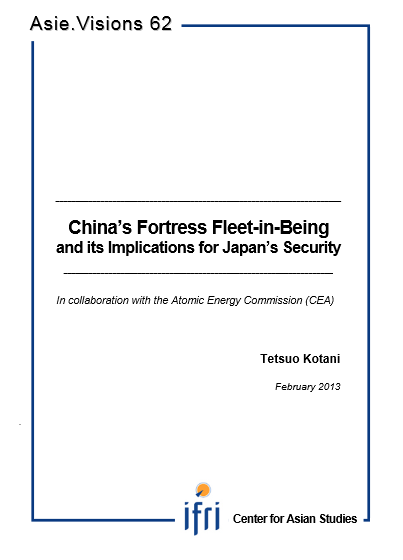China's Fortress Fleet-in-Being and its Implications for Japan's Security

This paper analyzes the rise of maritime China and its implications for Japan’s security policy.
In recent years, Chinese naval capabilities have been growing. Beijing aims to expand its maritime presence in the region, but also to limit the access of other fleets - primarily the US Navy - to its nearby waters. This Chinese anti-access/area-denial approach is analyzed here through the concepts of fortress fleet and fleet-in-being. Tokyo has reinforced its deterrence capability toward Chinese naval activities by setting up a more “dynamic defense” and concentrating efforts to protect its southwestern border. In addition to Japan’s efforts, the reinforcement of the alliance with the United States in the context of the American rebalancing toward Asia is also a major element in providing an effective response to Chinese maritime expansion. Despite his hawkish rhetoric, Japanese Prime Minister Shinzo Abe would not change Japan’s security policy dramatically but rather seek communication with Beijing in order to ensure crisis management.

Available in:
Regions and themes
ISBN / ISSN
Share
Download the full analysis
This page contains only a summary of our work. If you would like to have access to all the information from our research on the subject, you can download the full version in PDF format.
China's Fortress Fleet-in-Being and its Implications for Japan's Security
Related centers and programs
Discover our other research centers and programsFind out more
Discover all our analyses
China’s Strategy Toward Pacific Island countries: Countering Taiwan and Western Influence
Over the past decade, China has deployed a diplomatic strategy toward the Pacific Island Countries (PICs). This strategy pursues two main objectives: countering Taiwan's diplomatic influence in the region and countering the influence of liberal democracies in what Beijing refers to as the "Global South."

Opening up the G7 to South Korea to Address Contemporary Global Challenges
The G7’s global influence has diminished as powers like China reshape international governance through initiatives such as BRICS and the Shanghai Cooperation Organisation (SCO). With the G7 now representing just 10 per cent of the world’s population and 28 per cent of global GDP, its relevance is increasingly questioned.
Expanding SPDMM as a pivotal institution in the Pacific – A French perspective
The South Pacific Defence Ministers’ Meeting (SPDMM) is the only forum that brings together defense ministers from the wider South Pacific — including Chile, which is hosting it for the first time. This heterogeneous group of countries with varying resources, capacities, and interests — Australia, Chile, Fiji, France, New Zealand, Papua New Guinea (PNG), and Tonga — are united by their shared determination to strengthen cooperation on maritime security and humanitarian assistance and disaster relief (HADR) activities.
EU’s Derisking From China: A Daunting Task
With economic security as a major concern, the EU has recently turned to “derisking” from China. The EU strategy entails reducing critical dependencies and vulnerabilities, including in EU supply chains, and diversifying where necessary, while recognizing the importance and need to maintain open channels of communication.









